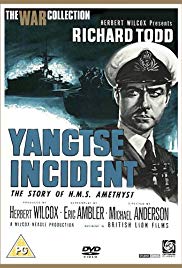
THE YANGTSE INCIDENT
UK, 1956, 112 minutes, Black & white.
Richard Todd, William Hartnell, Akim Tamiroff, Keye Luke, Donald Houston, Robert Urquhart.
Directed by Michael Anderson.
The Yangtse Incident concerns a British ship sailing up the Yangtze River to relieve the British Embassy in Nanking in 1949. It is the beginning of the communist revolution and the push by Mao Tse Tung. Revolutionary forces opened fire on the Yangtse and it returns fire, eventually being grounded on the rocks. Various diplomatic efforts are used, confrontation with the Chinese, then a daring escape during the night and arrival in Nanking.
The film comes from the middle 50s, almost at the end of the period in British film-making where there was the stiff-upper-lip tribute to so many of the daring actions in World War II. This film keeps that same spirit, even though the setting is in a new situation of conflict at the end of the '40s.
The film focuses mainly on the action on the ship, the Amethyst, and the dealing with the wounded, evacuating them, interviews with the Chinese, recuperating prisoners, and the daring escape. Richard Todd, who had appeared in a number of these films, is the new ship's commander. William Hartnell is the leading seaman, the leader with the heart of gold. Akim Tamiroff is much less convincing as playing the Chinese Colonel Peng. The film was directed by Michael Anderson, who made a number of the war tribute films like The Dam Busters as well as the first version of 1984. In 1956, his film Around the World in Eighty Days won an Oscar. He was to move on to bigger-budget, sometimes more inflated, colourful action adventures as The Jeweller's Shop from a screenplay by Pope John Paul II. This screenplay is by novelist Eric Ambler.
1. The popularity in the 50s of this kind of British action adventure? The tradition of the tributes to action in World War II and its heroism? The same spirit in the confrontation with the Chinese?
2. The film made so soon after the actual events? Britain's political stances in the mid-50s, the Suez crisis? The status of China, the communist revolution, Mao Tse Tung?
3. The black and white photography, the Yangtse River, the shore, headquarters? Life on the ship, the authentic atmosphere and sequences of the ship under fire and sailing? Musical score?
4. The political implications at the time, the role of the British, the Americans, Chinese government, the revolutionaries? The presentation of the military, their hard-line attitudes yet discussions with the British? The prisoners, hospitals, pressure and imprisonment, release? The beginning of a difficult half-century with China?
5. The mission of the Amethyst, going to Nanking? The Chinese opening fire, the return of fire, the combat sequences, explosions, damage to the vessel, injuries, the Number One and his injury but staying on? The attempts to make plans, to evacuate the wounded, for the others to go to shore? The two men taken to the Chinese hospital, their operations, convalescence, the attempts at exchange, the interviews with Colonel Peng, his ultimate refusal to let them go? Further negotiations and success?
6. British headquarters, Hong Kong, the authorities, their decisions? The help of the Americans with the doctor, transport? The flying-boat coming in? The helping of the wounded, the evacuation of the Number One?
7. Commander Kerans and his taking over, relationship with the men, decisions, information, communications, plans, the daring escape, the difficulties of going through the narrows, success? The typical British officer?
8. The leading seaman Frank, relationship with the men, dependable, his having to dress up as an officer and everybody ragging him? Typical of the men - and the sympathetic portrait of the sailors? The Number One and his injuries and reluctance to go?
9. The picture of the Chinese, the beginning of being demonised, the colonel and his arrogance, his assistant? Negotiations and the explanations of the communist revolution?
10. The interest in seeing the film in retrospect and how events and attitudes changed during the next fifty years?